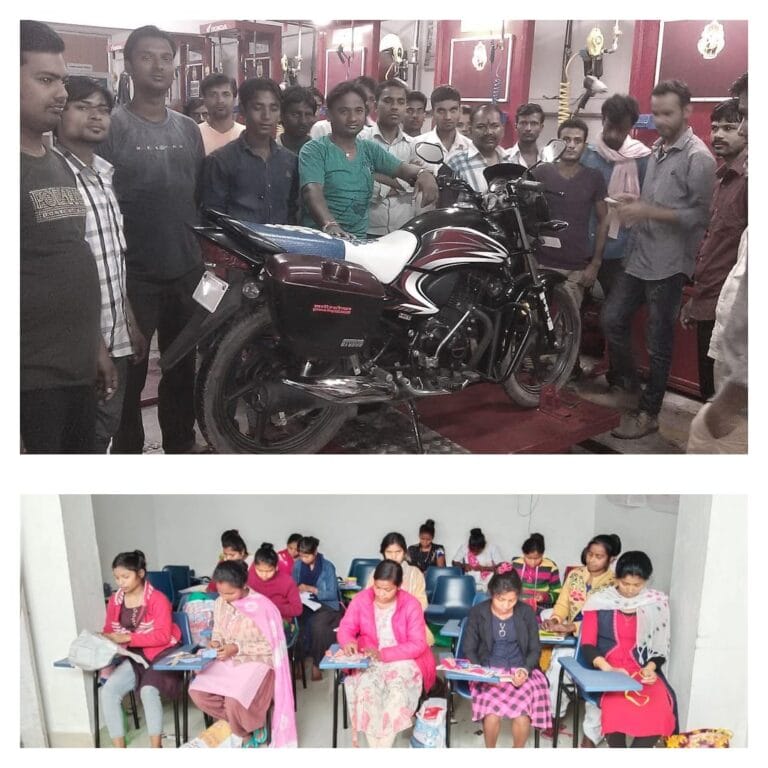
Skill Development & Employment
Skill development and employment generation are critical pillars of Samarth Foundation’s mission to promote sustainable development and empower communities. Recognizing the transformative impact of equipping individuals with market-relevant skills and facilitating access to dignified employment opportunities, Samarth Foundation has developed comprehensive initiatives aimed at fostering economic resilience, reducing poverty, and promoting social inclusion. This document explores in detail the various facets of our skill development and employment programs, highlighting their objectives, methodologies, achievements, and future directions.
Introduction
Samarth Foundation, established in 2022, is a non-governmental organization dedicated to advancing environmental conservation, social equity, and economic empowerment through innovative community-driven initiatives. Central to our mission is the belief that skill development and employment play pivotal roles in enhancing livelihoods, promoting economic growth, and fostering sustainable development. Our programs are designed to address the multifaceted challenges faced by individuals and communities, including unemployment, underemployment, and economic vulnerability, particularly among marginalized groups.
Objectives of Skill Development & Employment Initiatives
The skill development and employment initiatives of Samarth Foundation are guided by the following objectives:
Empowerment through Skills: To equip individuals with relevant skills, knowledge, and competencies that enhance their employability and entrepreneurial potential.
Promotion of Inclusive Growth: To promote inclusive economic growth by targeting marginalized groups, including women, youth, persons with disabilities, and rural communities.
Job Creation and Entrepreneurship: To facilitate job creation through support for small and medium-sized enterprises (SMEs), entrepreneurship development, and fostering a conducive business environment.
Enhancement of Livelihoods: To improve the economic resilience and livelihood opportunities of beneficiaries, thereby reducing poverty and enhancing quality of life.
Methodologies and Approaches
Samarth Foundation employs a multifaceted approach to achieve its skill development and employment objectives, leveraging partnerships, community engagement, capacity-building, and innovative strategies. Key methodologies include:
Needs Assessment: Conducting thorough assessments to identify skill gaps, local employment opportunities, and barriers to economic participation within target communities.
Training and Capacity Building: Providing comprehensive training programs tailored to the needs of different sectors, including vocational skills, technical skills, soft skills (e.g., communication, teamwork), and digital literacy.
Entrepreneurship Development: Offering support for aspiring entrepreneurs through business incubation, mentorship programs, access to finance, and market linkages.
Employment Placement Services: Facilitating job placement services, career counseling, resume building, and interview preparation to connect trained individuals with suitable employment opportunities.
Community Partnerships: Collaborating with local governments, educational institutions, private sector entities, and community-based organizations to enhance program effectiveness, sustainability, and outreach.
Achievements and Impact
Over the years, Samarth Foundation’s skill development and employment initiatives have yielded significant achievements and tangible impacts on individuals and communities:
Skill Enhancement: Thousands of individuals have acquired new skills or upgraded existing ones through our training programs, enabling them to access better employment opportunities or start their own businesses.
Entrepreneurship Success Stories: Several successful entrepreneurs have emerged from our entrepreneurship development initiatives, contributing to local economic growth and job creation.
Employment Placement: Through our job placement services, a considerable number of beneficiaries have secured gainful employment in diverse sectors such as agriculture, manufacturing, hospitality, and service industries.
Empowerment of Marginalized Groups: We have prioritized the empowerment of marginalized groups, including women, youth, persons with disabilities, and indigenous communities, by providing tailored training and support.
Economic Impact: Our initiatives have contributed to poverty reduction, improved household incomes, and enhanced livelihoods for vulnerable populations.
Case Studies and Success Stories
Case Study 1: Vocational Training in Sustainable Agriculture
In partnership with local agricultural institutions, Samarth Foundation implemented a vocational training program focused on sustainable agriculture practices. Participants received hands-on training in organic farming techniques, soil management, pest control, and crop diversification. As a result, many participants transitioned from subsistence farming to commercial agriculture, significantly increasing their agricultural productivity and income levels.
Case Study 2: Women’s Empowerment through Tailoring Skills
Through our tailoring and garment-making training program, women in rural communities gained valuable sewing skills and entrepreneurship training. Many graduates established their own small-scale tailoring businesses, producing and selling garments locally. This initiative not only provided economic independence to women but also contributed to the local economy by meeting the demand for affordable and culturally appropriate clothing.
Challenges and Lessons Learned
While our skill development and employment initiatives have achieved commendable success, they have also encountered various challenges:
Access to Resources: Limited access to financial resources, infrastructure, and technology can hinder the scalability and sustainability of training programs.
Market Demand: Aligning training programs with evolving market demands and ensuring job readiness of participants remain ongoing challenges.
Inclusivity: Ensuring inclusivity and accessibility for all target groups, including marginalized populations, requires tailored approaches and continuous adaptation.
Future Directions
Looking ahead, Samarth Foundation remains committed to expanding and enhancing its skill development and employment initiatives to meet emerging challenges and opportunities:
Scale and Reach: Scaling up our programs to reach more beneficiaries across diverse geographies and sectors, particularly in remote and underserved areas.
Technology Integration: Harnessing the potential of digital technologies for online learning, skill assessments, and remote employment opportunities.
Partnerships and Collaboration: Strengthening partnerships with government agencies, private sector entities, educational institutions, and international organizations to leverage resources and expertise.
Sustainability and Impact Assessment: Continuously evaluating program outcomes, conducting impact assessments, and implementing lessons learned to improve program effectiveness and sustainability.
Conclusion
In conclusion, Samarth Foundation’s skill development and employment initiatives are integral to our mission of promoting sustainable development and empowering communities. Through innovative approaches, partnerships, and a steadfast commitment to inclusivity and empowerment, we strive to create lasting positive impacts on individuals, families, and communities. By investing in skills and livelihoods, we contribute to building resilient economies, reducing inequalities, and fostering a more equitable and sustainable future for all.

